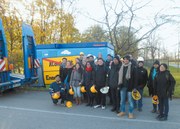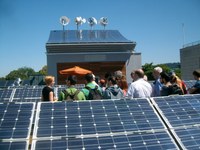Sustainability Assessment and Transformation

This major is a new interdisciplinary track for students who want to build a solid scientific basis for addressing topical sustainability questions, including: Which transformation strategies are most effective? How does the energy transition effect inequality? Is economic growth possible in the future? How much will technology help? How can we design a sustainable future for all?
You will become an expert in cutting-edge sustainability assessment tools, including material and energy flow analysis, cost benefit analysis, life cycle assessment (LCA), and legal analysis! You will engage in world-class training in systems thinking, critical thinking, and analytical thinking on the above questions. You will learn how to apply models and develop indicators to evaluate innovative business, technical, infrastructural, regulatory, policy, and behavioural solutions for a sustainable future.
Important facts about this major
Language: English
Teaching form: on-campus
Pace of study: fulltime
Study location: Freiburg
Start: only in winter term
Duration: 4 Semester
Application periode: March 1st - May 15th
ECTS: 120 ECTS (80ECTS modules, 10 ECTS Internship, 30ECTS Thesis)
Costs: 190€ semester fees, 1.500€ study fees (only non-EU students!)

- Students will gain the knowledge and skills to assess sustainable development strategies for organizations, communities, and societies.
-
World-Class training in systems thinking, critical thinking, and analytical thinking
- A number of courses involve modelling and programming in Python.
- The classes that deal with supply chains, circular economy, and material and energy flow accounting are based on the methods of industrial ecology, see the Industrial Ecology Open Online Course for an overview: https://www.industrialecology.uni-freiburg.de/teaching.aspx/
Program overview  pdf
pdf
Module details
1) Environmental and resource economics
- Price formation with economic externalities
- Economic effectiveness of transformation policies
- Resource pricing mechanisms
2) Material and energy flow analysis
- Energy supply and use
- Sustainable Circular Economy
- Mathematical modelling of material cycles
3) Ecosystem processes and functioning
- Understand and model ecosystem processes across scales
- Carbon and water cycle, nutrient cycling, and community dynamics
- Understand how ecosystem functions relate to structural components
4) Supply chain modelling, indicators, and responsibility
- Leontief input-output model
- Carbon and other environmental footprints
- Supply chain management
5) Systems thinking, planning & transition
- Complex adaptive socio-ecological systems
- Planning and governance under uncertainty
- Transition management
6) Energy system transition
- Energy technology and economics
- Energy policy
- Innovation and transition theory
7) Sustainability law and transformation
- Basic principles of environmental law
- Case studies of environmental litigation
- The role of regulation in sustainable development
8) Research Project
- Interdisciplinary research project
- Student-driven content
- Knowledge integration
In addition, you will choose three elective courses, for example:
- Life cycle management
- Technology assessment
- Gender planning
- Economics of biodiversity and ecosystem services
- Human-environment interactions
- Environmental and energy transition law

Target Group
The track is designed for students with a background in environmental natural sciences, economics, industrial engineering, or quantitative environmental social sciences, who want to acquire a high-profile university education in sustainability assessment and transformation.
You will acquire the skills to become a sustainability transformation leader with a deep and broad understanding of the environmental, material, energy, economic, regulatory and lifestyle basis of sustainable development!
Career Opportunities

- research career
- sustainability planning jobs
- consulting jobs
- management positions in industry, public administration
- national and international organizations
Application and Requirements

Requirements
- BSc-Degree with grade point average of at least 2.5
- English C1
- 40 ECTS in natural sciences and ecology
- 10 ECTS in statistics and geomatics
- 20 ECTS in environmental social sciences
Application periode: March 1st - May 15th
Application portal: HISinOne
further information: "Application"
Coordinator & Contact


